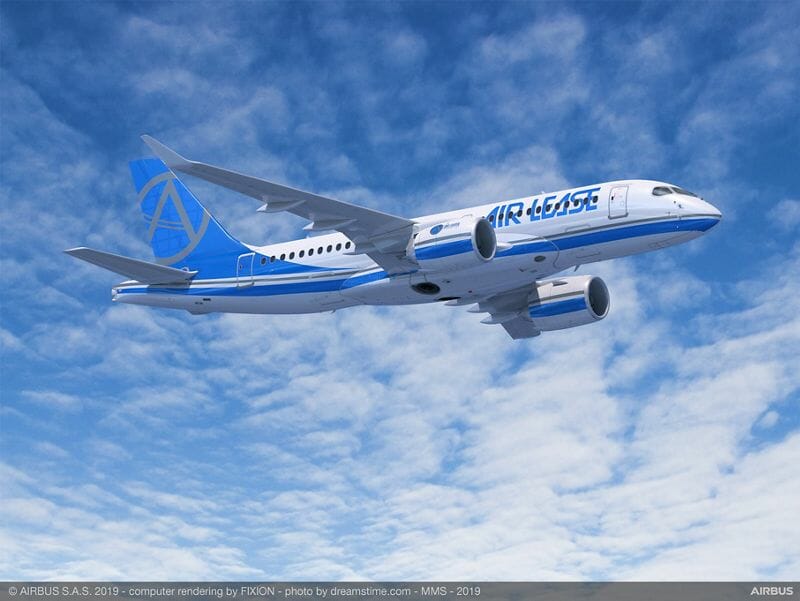
ALC AirbusA220
Air Lease Corporation (ALC) is currently unable to ‘reasonably estimate’ the impact of the Covid-19 crisis on its business, operational results, and financial position for the foreseeable future, the US-lessor reported in its Q1-results on May 7. The company is having many requests from airlines for payment deferrals but so far there have been no outright leasing cancelations.
Beginning in Q1, ALC received requests for accommodations from most customers. So far, the lessor has reached an agreement on deferred partial lease payments for Q1 and Q2 with 46 percent of its clients. This amounts to $124.6 million or 6 percent of total annual revenues.
ALC expects to receive these payments later this year but is taking into account some rental payments will not be paid. Lessees have also renegotiated extensions which could result in the return of aircraft if airlines go bankrupt in the coming months. In the current market environment, ALC wouldn’t be able to place these aircraft again as quickly as in the recent past, pressuring lease rates downwards.
As ALC says: “We expect increased airline reorganizations, liquidations, or other forms of bankruptcies, which may include our aircraft customers and result in the early return of aircraft or changes in our lease terms. As of the date of this filing, we had six aircraft across three airlines which were subject to various forms of insolvency proceedings.”
By the end of Q1 had an owned fleet of 300 aircraft a managed fleet of 82 with an aggregate book value of $19.2 billion. Of the fleet, 29.2 percent are in use in Europe, 27,7 percent in Asia, 15 percent in China, 12.1 percent in the Middle East and Africa, 5.8 percent in Central and South America, 5.1 percent in North America as well as 5.1 percent in the Pacific, Australia, and New Zealand.
Steven Udvar Hazy’s company has commitments for 399 aircraft for delivery until 2024, of which 84 percent through 2022 has been placed with lessees on long-term leases. ALC itself has not requested any delivery deferrals but deliveries could be delayed by Airbus and Boeing as a result of the impact of Covid as production has been interrupted in the last few months. This might continue in the coming months.
Deliveries of the MAX depend on the return to service and resumption of production. As ALC says: “We are currently in discussions with Boeing regarding the mitigation of possible damages resulting from the grounding of, and the delivery delays associated with the 737 MAX aircraft that we own or have on order, which could result in changes to the commitment table.”
In the recent past, ALC has repeatedly been affected by delays of A321neo production as Airbus struggled with the Airbus Cabin Flex-version. While these have been mastered successfully according to Airbus CEO Guillaume Faury, the impact of the reduced production rate from 60 to 40 neo’s on ALC’s order book remains to be seen. In its Q1 presentation, ALC it expects continued delays through 2022.
Demand expected for newer and leased aircraft
Despite the difficult situation of the airline industry now and for the next couple of years ALC remains buoyant on the market: “We expect the aviation industry to recover over time from the impact of Covid-19, and in the long-term, we remain optimistic. While we believe some aircraft lessors may consolidate or cease operations as a result of the pandemic, we believe the overall aircraft leasing industry has remained resilient over time across a variety of global economic conditions and remain optimistic about the long-term fundamentals of our business.”
“As a result of the Covid-19 pandemic, some airlines have accelerated their plans to retire older, less fuel-efficient aircraft that have higher maintenance costs in the current environment, and we anticipate that airlines will continue to accelerate the retirement of this type of aircraft, ultimately increasing demand for newer aircraft over time. We also anticipate that when airlines need to add new aircraft to their fleet, they will increasingly elect to lease aircraft instead of purchasing aircraft to reduce capital requirements and manage other operating expenses and that we will benefit from that trend.”
This view was shared by Boeing CEO David Calhoun on April 29, when he said he expects airlines to retire old planes and replace them with additional new aircraft.
Air Lease ended Q1 with $511 million in revenues, up from $466 million. Net income available to shareholders was $133 million, down from 138 million. Pre-tax profit margin dropped from 37.5 to 33.6 percent.
The lessor bolstered its liquidity position to $6.3 billion after issuing $1.4 billion in medium-term notes and increasing the capacity of its revolving credit facility by $250 million.
Views: 3




